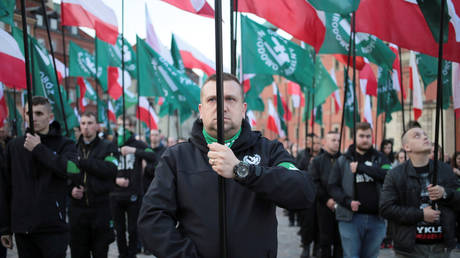
After weeks of public pressure, a former member of a Polish far-right group has lost his job as regional head of a powerful government agency tasked with – among other things – investigating Nazi crimes against Poland.
Tomasz Greniuch, a historian by training, has resigned his position as regional director of Poland’s influential Institute of National Remembrance (IPN). It came on Monday after weeks of pressure from politicians, activists and public figures, who saw him as an extremely inappropriate choice to hold the position given his past ties to the far-right.
Until 2013, Greniuch was a prominent organizer in the National Radical Camp (ONR) — an ultranationalist organization that originated as a 1930s Polish fascist movement.
The IPN was created to investigate crimes committed against the Polish nation first by the Nazis and the communists, whom Warsaw sees as equally evil. Greniuch’s recent appointment was perceived by many as the latest piece of evidence that the institute has become a vehicle to promote toxic nationalism on behalf of the country’s conservative government.
The 39-year-old was appointed as head of IPN’s Wroclaw office earlier this month. The promotion came despite the fact that he never made a secret of his dubious connections. Greniuch was part of the ultranationalist Polish scene since 1999 and is even credited for founding the ONR branch in the city of Opole in 2002.
The group, which is also known as Falanga, like many other fascist organizations throughout the world, was behind numerous protests soaked with xenophoic sentiment. Critics say it is an openly anti-Semitic hate group.
Members routinely use the Nazi salute, though they themselves insist that the notorious gesture is meant to invoke ancient Rome. “Why should I be responsible for the fact that it was appropriated by Hitler?” Greniuch himself explained to the media back when he was among the ONR ranks.
The group’s purported opposition to Nazism however may not be that clear cut. The Falanga, for example, holds in great esteem Belgian Nazi collaborator Leon Degrelle. Greniuch authored a book glorifying the man, which was published in 2013. In another book written under a pseudonym, Greniuch allegedly described himself as “100% Aryan.”
As the domestic outcry over the appointment grew, the Israeli embassy in Warsaw said it was “surprised” to learn his attitude to the Nazi salute and suggested he visit the Auschwitz Museum. The official reacted to the criticism by publishing an apology on the institute’s website. He called his past ‘Roman salutes’ “youthful bravado, turning a deaf ear to common sense and consequences” and insisted that he was never a Nazi sympathiser.
The institute said that when Greniuch cut ties with the far right in 2013, he “chose the path of a historian, researcher and truth seeker” and has proven his competence and commitment by working for the IPN for three years as the head of the sub-branch in Opole. His scholarly work during that time was appreciated by the government, as evidenced by President Andrzej Duda awarding him in 2018 with the Bronze Cross of Merit, a state decoration.
The claim of him being a reformed man however was contradicted by images showing Greniuch meeting various ONR activists as late as in 2018, which the Polish media dug up. During one such encounter, which happened in 2016, he apparently met two members of the group who had prior court convictions for publicly promoting Nazi ideology. In a radio interview that he gave in 2017, he reportedly said he was “unashamed to invoke the radical nationalist tradition” that had formed him.
The scandal finally ended Greniuch’s directorship this week. Before the sacking was confirmed on Monday evening, President Duda remarked that the high office can only be held by a “a person of good repute,” while a top aide to Prime Minister Mateusz Morawiecki said there will be a change of leadership “for the sake of the institution and image of Poland.”
Like this story? Share it with a friend!




